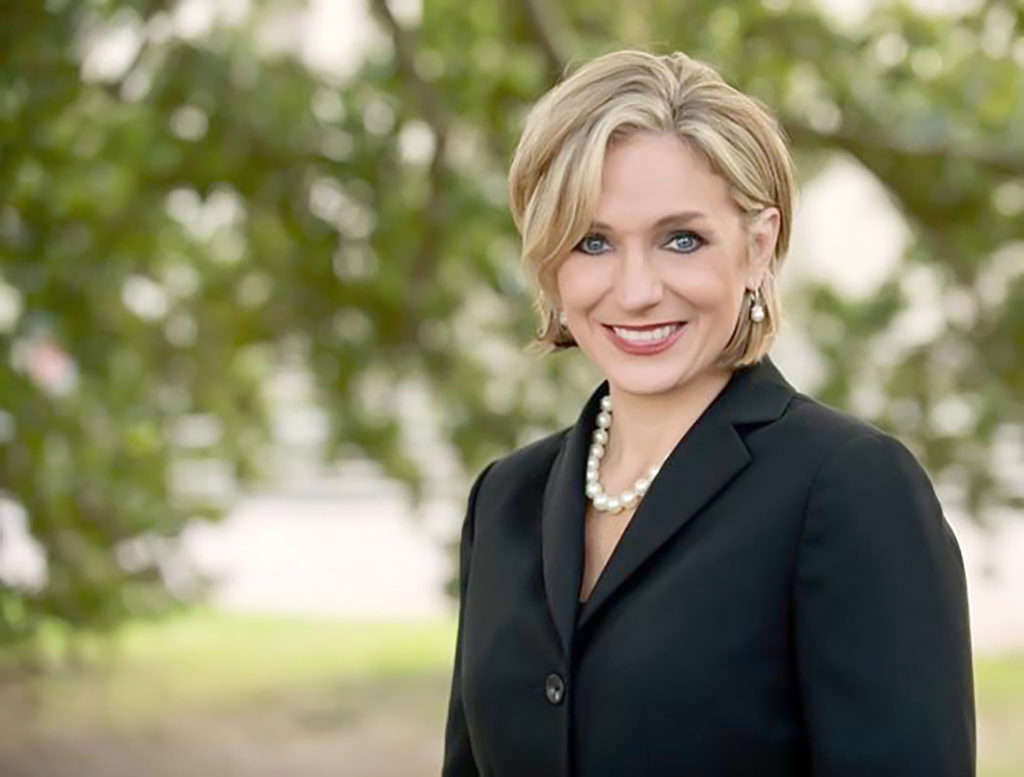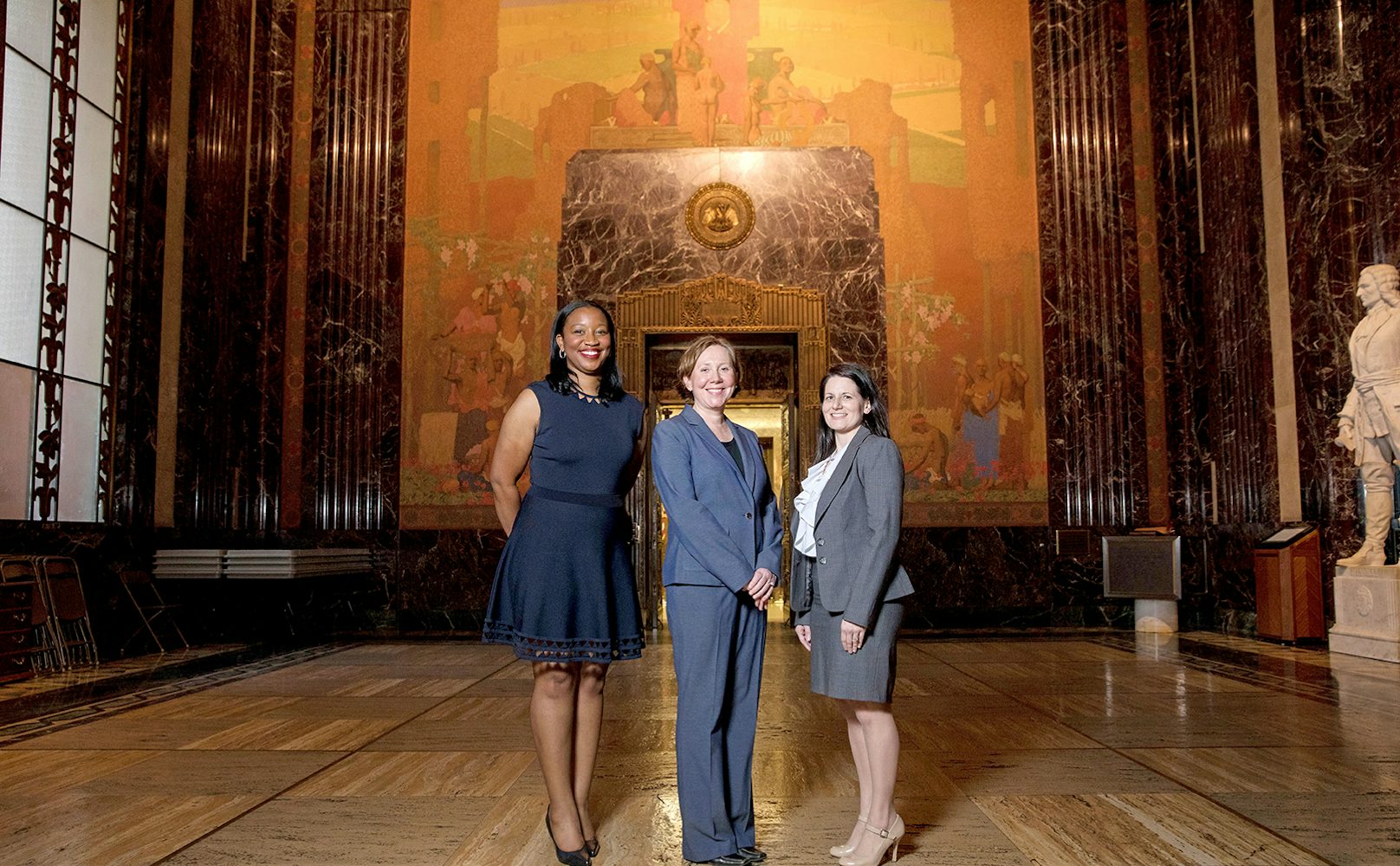POLITICS READY: Among the Baton Rouge-area women going through the Emerge program are, from left, Alsie Dunbar, Belinda Davis and Morgan Lamandre. (Photo by Collin Richie)
The hardest part, says Belinda Davis, is deciding to run.
Despite the credentials of being an LSU political science professor and education advocate, Davis had never run for public office before, especially as a Democratic woman in a right-leaning Baton Rouge district. But when a special election was called last fall to fill an open school board seat, Davis decided to give it a shot.
“That decision was the most difficult part,” recalls Davis. “Then it’s fundraising. Asking for money is hard, but I only had one person say no. On the flip side, after I lost, the hardest part was feeling like I let down people who invested time or money into my campaign.”
Davis lost, but deciding to even run for public office means she made it further than most women, who research shows are less likely than men to consider political careers. And, it turns out, she enjoyed the campaign trail, only growing her passion for public service. So when an opportunity arose this year to join one of Louisiana’s first and only organizations training women to run for office, she took it.
As one of 25 women in the inaugural Emerge Louisiana class, Davis joins a formidable group of professional Democratic women—including lawyers, engineers, doctors and educators—throughout the state being recruited and groomed for public office. Buoyed by the support, Davis plans to run again next year, setting her sights a little higher.
“I think I’m going to run for the Legislature,” she says.
She’ll be in good company. The majority of Emerge Louisiana women are considering a 2019 run as well, including three other Baton Rouge participants: Alsie Dunbar, an SGS Oil and Gas process engineer and consultant; Morgan Lamandre, attorney and legal director of Sexual Trauma Awareness & Response; and Beverly Brooks Thompson, president and executive counsel of Brooks Thompson Consulting.
“It speaks to the energy here—women are fed up with what’s going on in Baton Rouge and D.C. They know they can do a better job themselves and are ready to prove that.”
—MELANIE OUBRE, executive director, Emerge Louisiana
Emerge Louisiana—an offshoot of Emerge America—is zeroing in on the 2019 state legislative elections, not only because women are vastly underrepresented in both chambers, but also because at least 50 seats will be open next year as term-limited state lawmakers make their exit.
In other words, the Legislature is in for a massive overhaul, and Democratic women are seizing the opportunity. If Emerge America’s success is any indication, they will be a force to be reckoned with. Last year, 152 out of 208 Emerge alumnae nationwide won their elections—a 73% success rate.
Since the election of President Donald Trump, Emerge affiliates have been rapidly popping up across the nation. Today, 25 states have programs established or in the works, including Louisiana’s neighbors: Texas, Mississippi and Arkansas.
Emerge Louisiana, established last year, chose 25 women out of 60 who applied for its first six-month training program. The goal is to get more women involved in politics, and in doing so, the organization hopes to transform a state, and nation, it sees as moving in the wrong direction.
“It speaks to the energy here—women are fed up with what’s going on in Baton Rouge and D.C.,” says Emerge Louisiana Executive Director Melanie Oubre. “They know they can do a better job themselves and are ready to prove that.”
Lamandre, a fixture at the Capitol through her work with STAR, has been disheartened by the divisiveness and extreme partisanship that has come over the Legislature in recent years, leading to a frustrating lack of progress for the state. She wants to be part of the solution, not the same problem.
“The biggest motivation for me to run is the lack of compromise and collaboration at the Capitol right now,” Lamandre says. “I want to do that. I’m a collaborative person. Yes, I’m a Democrat, but I still want to sit down and have dialogue.”
As a woman and a mother, however, Lamandre is still unsure about running for office. She isn’t one to jump into things, she says, because she first has to know how it will affect her family and that she is fully prepared, which is a common reservation among women.
Even though women are just as likely as men to win elections, they are less likely to consider running or to be recruited. Why? Because women tend to wait until they are more qualified than men to run for office. And there are so few women already in public office, especially in Louisiana, where women comprise just 15% of the state Legislature and none currently hold statewide positions.

As if the statistics aren’t daunting enough, women who have run as first-time candidates, like Dunbar, who ran for House District 58 last year, often have several barriers to overcome. Dunbar says there’s pressure to turn women off to running for office. When she ran, she did not have the support from people she once supported. Her opponent, who ended up winning, was a former councilman with a support network already in place.
“It was a tough, eye-opening experience, sometimes discouraging,” Dunbar says. “I felt it was everyone against me. I did not have the traditional support system.”
Now with Emerge, Dunbar feels like she does have a stable network to lean on, which she describes as a “sisterhood” with a wealth of resources.
The Emerge trainings, as part of the six-month program, take place on weekends and are typically one to two days long. They go over big topics like campaign messaging, fundraising, budgeting, media training, endorsements and more. Participants also receive individual consulting, and each program includes diversity and cultural competency training.
On graduation day in June, Emerge will bring in political mentors who hold seats similar to the ones the women are running for, and help develop five-year plans. In the summer, Emerge will host a boot camp version of the six-month flagship program on July 13-15, right before qualifying ends for 2018 elections.
Emerge has received a positive response so far, gaining more interest and applications than Oubre initially expected. The women come from various backgrounds but are all strong community leaders with a passion to see change where they live, Oubre adds. And the program is providing the tools to get them there.
“I feel better equipped, like I can stand with the best of them,” Dunbar says. “More women need to step out in faith. There’s strength in numbers, and we are stronger than we think.”
